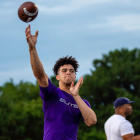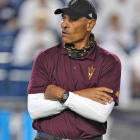In what almost felt like a Friday afternoon news dump, last week the NCAA announced transfer quarterback Justin Fields' waiver had been approved, and he would not have to sit out the 2019 season after transferring from Georgia to Ohio State. There were plenty of reactions to the news, ranging from positive to "THIS IS THE END OF COLLEGE FOOTBALL AS WE KNOW IT."
And, honestly, I don't have any idea what to make of it.
I have long been an advocate for players as I believe they don't receive nearly their fair share of benefits based on the revenues they produce for their schools. Free educations are a wonderful thing, and I would never argue otherwise, but as valuable as they might be, getting your tuition paid for when you've helped make millions upon millions of dollars for your school is like somebody giving you a $100 tip on a $5,000 tab. If you knew somebody who gave a tip that size you'd call them cheap. For some reason, you don't hear as many people yelling "if a two-percent tip isn't enough for you, nobody is forcing you to work there" as often as you hear "well, nobody's forcing them to play football."
Still, while I firmly believe players deserve a larger cut, and I only think it's fair that players be given the same freedom of movement that their coaches and fellow students have, I do wonder about the unintended consequences should the NCAA provide it. The best of intentions often lead to unforeseen problems, and while I don't think college football will reach the true "free agency" that some fear -- the majority of transfer players tend to move to "lesser" situations -- it's hard to know exactly what it'll look like five years from now.
Not surprisingly, how people feel about the situation at the moment usually depends on how it affects them in the near future. ESPN.com's Adam Rittenberg and Tom VanHaaren wrote a story earlier this week that -- shocker -- shows that coaches aren't fans of players having more freedom, while players are in favor of it. Of course, another wrinkle in there is that just because coaches might not like it, that won't stop them from trying to take advantage of it. CBSSports.com's Dennis Dodd talked to Missouri coach Barry Odom this week following the NCAA banning his team from the postseason in 2019. According to Odom, the 19 seniors on his roster are being "contacted and bombarded non-stop" by fellow coaches looking to take advantage of the NCAA allowing the seniors to transfer without penalty due to the NCAA penalties.
"Who'd we beat 51-17 this year? Tennessee? Yeah, those guys," Odom told Dodd. "They are non-stop reaching out daily [saying], 'Hey, come here.' The grass is not always greener somewhere else."
Odds are a compromise will come from all of this. I envision the NCAA adopting a format in which all players are allowed a freebie. In other words, every scholarship athlete will be allowed one transfer while eligible without having to sit out a season. Should they decide to transfer again -- no matter the reason -- they'll be forced to sit out a season. Like the current rules, this would not include graduate transfers, who will continue to transfer without sitting out even if they transferred before.
But then there are those unintended consequences.
More transfers lead to more work for coaches, and more work for coaches will lead to more resources allocated to coaching staffs -- both in money and personnel. More money and resources being dedicated to larger coaching staffs could then lead to declining profits, er, I mean revenues, for athletic departments. Declining revenues in athletic departments would lead to decreased odds players receive a fair share of the money they generate as the schools could say they can't afford it.
Or we could see more transfers lead in a different direction entirely. Maybe more freedom of movement amongst players brings a more professional approach to roster construction at the college level and ultimately leads to players being paid. Then college football becomes even more of an arms race than it already is, as the schools with the most money are able to attract all the best players, creating a more significant gap between the haves and have nots. We then see the haves break off entirely from the have-nots to form their own league. Basically a conference realignment on steroids scenario in which the biggest programs break off, leaving old conferences and rivalries in the dust to pursue a more lucrative future elsewhere. Then, lo and behold, the people who yelled "THIS IS THE END OF COLLEGE FOOTBALL AS WE KNOW IT" following the Fields announcement are proven correct.
These are extreme examples, and I don't share them as predictions. I'm just using them to make a point that I'm not sure there's a "correct" answer here. Relaxed transfer rules could be good for college football, they could be bad for college football, or they could ultimately have no significant impact on the sport at all. We'll have to wait and find out.
Submit your questions to be answered in this space on Twitter (@TomFornelli) or via email (tom.fornelli@cbsinteractive.com)
If the AAF or the XFL signs players from college after their freshmen year, could this force the NCAA to finally pay college athletes? If they don't, Will this be the downturn of college football as we know it? - @william_land_
Man, another question about the end of college football as we know it.
First of all, I very much doubt that AAF will challenge the NFL's rules about player eligibility. The AAF wants to work in concert with the NFL. It would like to be seen as a developmental league for the NFL in the long run, so there's no way it would risk ticking the NFL off by trying to usurp talent from the college level.
Now, the XFL may try it someday, and Don Yee, Tom Brady's agent and the man behind Pacific Pro Football has already said he's going to try to. But there are a few obstacles in the way. First of all, these leagues have to survive. Over time this has proven to be incredibly difficult for other professional football leagues to do in the United States. The XFL will have a lot of work to do before it can convince enough players to leave college early to play in it to hurt the NFL. It's not impossible by any means, but if I were the NFL or college coaches, I wouldn't be all that worried about the possibility right now.
Is there anything dumber than the NCAA vacating wins? - Kevin
Imagine you're in high school and your parents give you an 11 p.m. curfew. You don't care about this curfew. You stay out all night partying with your friends, having a terrific time, only to stumble in through the front door of your home at sunrise to find your parents standing there. They're angry. Seriously, that vein in dad's forehead is showing, and that's how you know you're screwed. You figure you're never going to see your friends again. Your parents then begin yelling at you seemingly forever before they reach the point where they mete out your punishment. You tremble in fear and close your eyes and hear your parents say it.
"We are going to vacate last night. You are to spend the rest of your life pretending it never happened. You will erase any photos you took from your phone, and you will untag yourself from any photos that appear on social media."
That would be a pretty stupid punishment, wouldn't it? So, yeah, when it comes to possible NCAA punishments, the vacation of wins is the dumbest.
Top 5 most annoying fans traditions besides cowbells? - @homerance
There is only one annoying tradition amongst college football fans, and it's arguing in my Twitter mentions for hours over something I don't care about.
What is the ceiling for Matt Wells' first year at Texas Tech? In my mind, barring Oklahoma finding yet another Heisman winning quarterback from somewhere, the conference seems wide open. I don't know how 10-2 at Utah State translates to the Big 12, but it's tough imagining them not making at least some progress defensively. Even assuming Texas and Oklahoma are automatic losses I still think this team has an 8 or 9 win season in them, how about you? - T.J. McGarry
Eight or nine wins is very optimistic. I'm intrigued by the Big 12 in 2019 because I think it could prove to be the most entertaining conference to follow as far as who will win it. I just don't know if you should expect Texas Tech to be a part of that title race. Matt Wells did well early in his tenure at Utah State, but he inherited a pretty good team with a good QB in Chuckie Keeton. The Aggies went 11-2 the season before Wells replaced Gary Andersen, and dropped to 9-5 in Wells' first season before going 10-4 in Year Two.
The Tech team Wells takes over went 5-7 last year and hasn't won eight games in a season since 2013. The Raiders haven't had a winning season in Big 12 play since going 5-3 under Mike Leach in 2009, his final season.
Texas Tech isn't a quick fix. If I'm you and I see a schedule that includes road games against Arizona, Oklahoma, Baylor, West Virginia and Texas, I'm just hoping to get to a bowl game and see some improvement on defense.
"There was a farmer who had a dog and Bingo was his name-o." Is Bingo definitely the dog, or could it actually be the farmer? - @Psully226
Bingo could be the farmer, but the structure of the sentence makes it more likely that the dog was Bingo. If the farmer had been Bingo, the sentence likely reads "Bingo the farmer had a dog."
I hope this clears things up.
Could Alabama beat the San Antonio Commanders? - @RyanGazdacka
I'm going to say yes only because the Commanders and all AAF teams have been working together for like a month, and it shows.
What are the reasonable expectations for Justin Fields next year, given that he and the passing game coordinator are both learning a new playbook? - @Max_thePower
I know that Fields served as a backup to Jake Fromm last season at Georgia, but that says more about Fromm and his fit in Georgia's offense than it does Fields. I don't know what kind of numbers he'll put up, and it's possible he could get off to a shaky start, but Fields wasn't a highly-rated recruit by accident. His talent combined with the talent that will be around him will lead to an impressive season.
You get to watch one FBS game per week in 2019. Preselect them now. - @Lee0107
An interesting question that I won't go too far in depth on since we're already running long here.
Week 1: Miami vs. Florida
Week 2: LSU at Texas
Week 3: Clemson at Syracuse
Week 4: Notre Dame at Georgia
Week 5: Ohio State at Nebraska
Week 6: Washington at Stanford
Week 7: Oklahoma vs. Texas
Week 8: Michigan at Penn State
Week 9: Notre Dame at Michigan
Week 10: Georgia vs. Florida
Week 11: LSU at Alabama
Week 12: Georgia at Auburn
Week 13: Penn State at Ohio State
Week 14: Ohio State at Michigan
Week 15: Army vs. Navy
In other news, opening weekend next season looks weak as hell considering the games we've seen in recent years.
If you had to set an over/under for the number of seasons until Purdue makes an appearance in the Top 25 at any point in the season, what would it be? 1.5? - @myleshandley87
I would set it at 1.5 years, but I'm sure you're more interested in knowing whether I'd go over or under. I'm going over because the 2019 schedule opens with a road game against Nevada, and then Vanderbilt and TCU. Those are three tough nonconference games to open the season with, so unless they run roughshod through the Big Ten, it's hard to imagine them cracking the top 25 next season. I do think Jeff Brohm will have Purdue ranked before 2022, though.





















